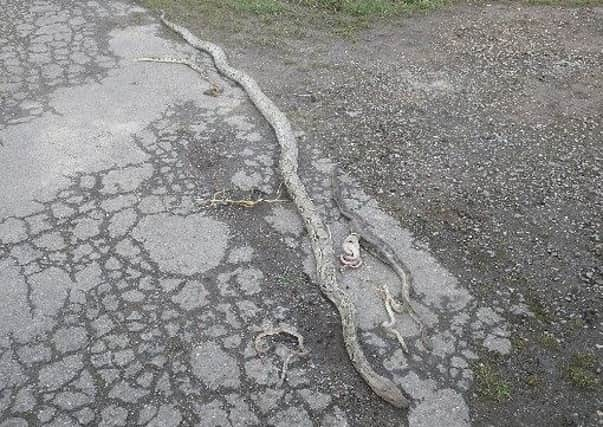RSPCA received more than 340 calls about exotic animals in Lincolnshire last year


The UK’s largest and oldest animal welfare charity has released its annual statistics today (Thursday 25 April), which reveal the plight of the more unusual animals being kept as pets and for entertainment in the UK.
Nationally, the charity received a total of 15,790 calls about abandoned, stray, sick, suffering and neglected exotic reptiles, mammals, birds and fish, more than 40 a day, or more than one every hour.
Advertisement
Hide AdAdvertisement
Hide AdIn Lincolnshire, the charity received 342 calls about exotic animals, rescued 86 exotic pets and 53 exotic fish, a rise on 2017 of 87 creatures and 18 fish.
The RSPCA believes the reason behind some of the suffering of these exotics pets is that owners do not do their research and don’t understand the type and amount of care that they need, resulting in them being neglected, dumped or escaping.
The RSPCA attended seven dead snakes dumped in Lincolnshire in March last year.
Chief Inspector for the area, Becky Lowe, said: “Although their numbers are small compared to more common pets, we have real concerns about the welfare of reptiles and other exotic animals kept as pets or entertainment in this country.
Advertisement
Hide AdAdvertisement
Hide Ad“Reptiles and other exotic pets are completely reliant on their owners to meet their welfare needs, including requiring the correct levels of heat, light and humidity, plus an appropriate diet.
“Many of the animals we’re called to help are found stray outside, where they can very quickly suffer in the cold.
“These animals are commonly found for sale in pet shops and are advertised online.
“At least in the past, animals have often been handed over to buyers with little or no information about how to care for them properly, although new regulations in England should improve this.
Advertisement
Hide AdAdvertisement
Hide Ad“In some cases, we believe owners take them on simply because they believe they will be easier to care for than other pets, but it is essential that people research what is required in the care of their pet, from food, equipment, environment and vet care, before taking one on.
“We would also urge them to ask for help if they’re struggling to meet their needs.
Becky continued: “We believe that people may buy them with little idea of how difficult they can be to keep and the animals are sometimes neglected when the novelty wears off and the commitment hits home.
“This is why we would encourage anyone thinking of getting an exotic pet to find out as much as possible about the animal’s needs and whether they’re the right pet for them.”
Advertisement
Hide AdAdvertisement
Hide AdThe RSPCA, which has a team of specially trained exotics officers, rescued more than 4,000 exotic animals in 2018, including over 500 snakes, more than 300 turtles, 145 bearded dragons, five raccoon dogs and even four marmosets and one wallaby.
The RSPCA defines ‘exotic animals’ as wild (non-domesticated) animals kept as pets, which includes invertebrates, fish, amphibians, reptiles, birds and exotic mammals, such as African pygmy, hedgehogs and raccoon dogs.
Last year, the RSPCA received 11,546 calls reporting cruelty, neglect, injury and suffering of all animals in Lincolnshire - a slight increase from 11,116 in 2017 - including 2,585 about cats, 3,606 about dogs and 729 about horses.
The RSPCA’s annual stats also reveal, across England and Wales in 2018, the number of calls the RSPCA received to its 24-hour cruelty hotline about all animals increased by 13% from 2017 to 1,175,193 calls.
For information about the exotic animals looking for a home at the RSPCA, visit www.rspca.org.uk/findapet and to learn more about how to care for these animals, see the RSPCA’s animal care sheets.